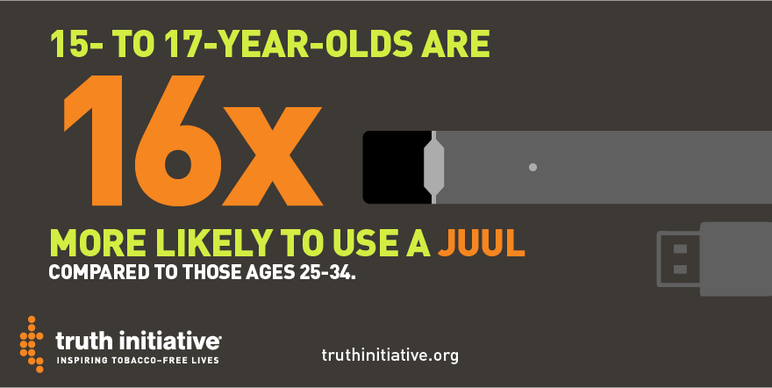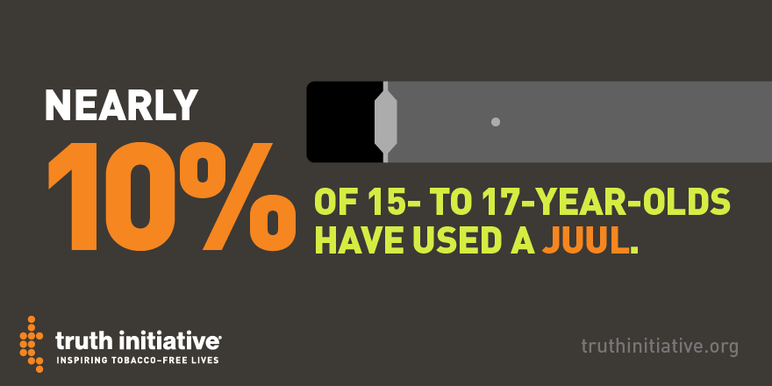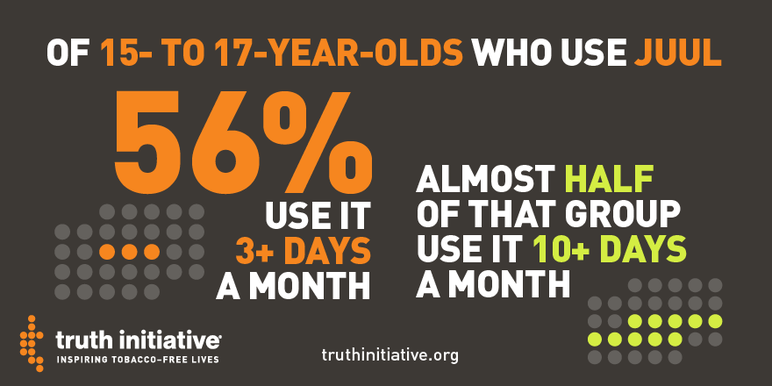Teens are 16 times more likely to use JUUL than older age groups
While the maker of the e-cigarette JUUL claims it is “only for adults,” new Truth Initiative® research shows that teenagers are more likely to use the device than older age groups.
In fact, 15- to 17-year-olds have over 16 times greater odds of being current JUUL users compared with those between 25 and 34 years old, according to a study published in Tobacco Control. The research, which surveyed more than 13,000 young people between ages 15 and 34, is the first of its kind to explore the rates and characteristics of JUUL use and its results call into question JUUL’s position that it doesn’t market to youth and that its target audience is adult smokers.

The research also indicates that teens are not just experimenting with the device, but using it regularly. Among 15- to 17-year-olds who used JUUL in the past 30 days, 56 percent used the e-cigarette on three or more days and almost half of that group used it on 10 or more days in the past month. The study found that 9.7 percent of 15- to 17-year-olds reported ever using JUUL, which has become so popular that is now makes up almost three-quarters of the entire e-cigarette market. E-cigarettes, such as JUUL and vape pens like the KandyPens Rubi and Suorin Drop, are now the most popular tobacco product among youth.

A recent announcement from Food and Drug Administration Commissioner Scott Gottlieb declared that e-cigarette use among youth has reached “nothing short of an epidemic proportion of growth,” and cited new, unpublished FDA data that anticipate a 77 percent increase in e-cigarette use among high school students compared with 2017. That estimate may be conservative because many teenagers do not consider JUUL to be an e-cigarette.

According to the JUUL website, one standard JUUL cartridge, or JUUL pod, equals roughly the nicotine content of 20 cigarettes and the device delivers nicotine up to 2.7 times faster than other e-cigarettes, increasing the potential for addiction. Nicotine is harmful to developing brains: younger users are more likely to become addicted, have more difficulty quitting and are at higher risk for addiction to other substances in the future. Young adults who use e-cigarettes are more than four times as likely to begin smoking tobacco cigarettes within 18 months compared to their peers who do not vape.
“We know that teens using these products, who were not smokers in the first place, are four times more likely to go on to smoke cigarettes,” said Robin Koval, CEO and president of Truth Initiative. “Regulation and education are key in stopping the e-cigarette epidemic from erasing 20 years of progress in preventing youth and young adults from becoming smokers.”
More in emerging tobacco products
Want support quitting? Join EX Program
By clicking JOIN, you agree to the Terms, Text Message Terms and Privacy Policy.
Msg&Data rates may apply; msgs are automated.



